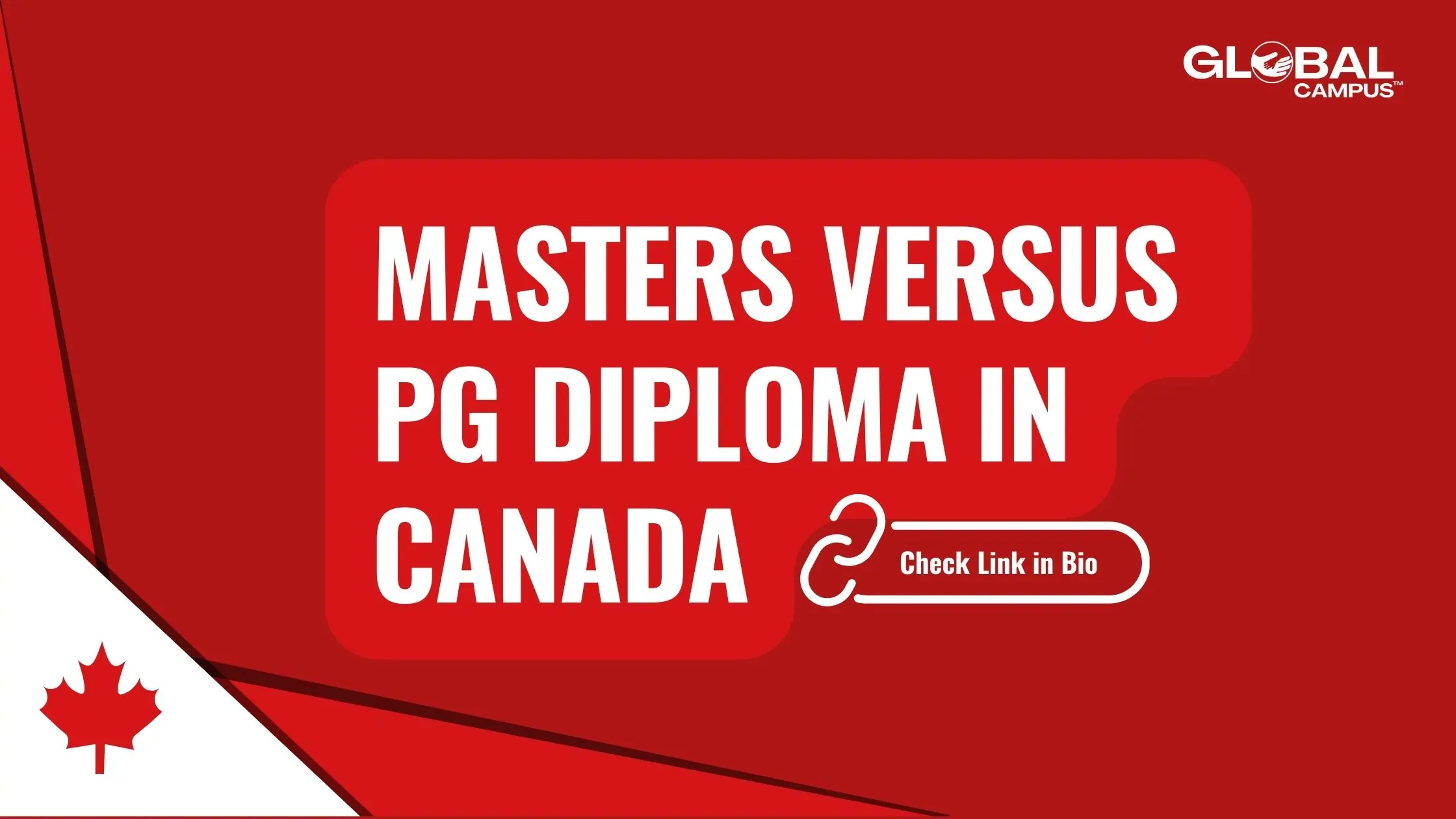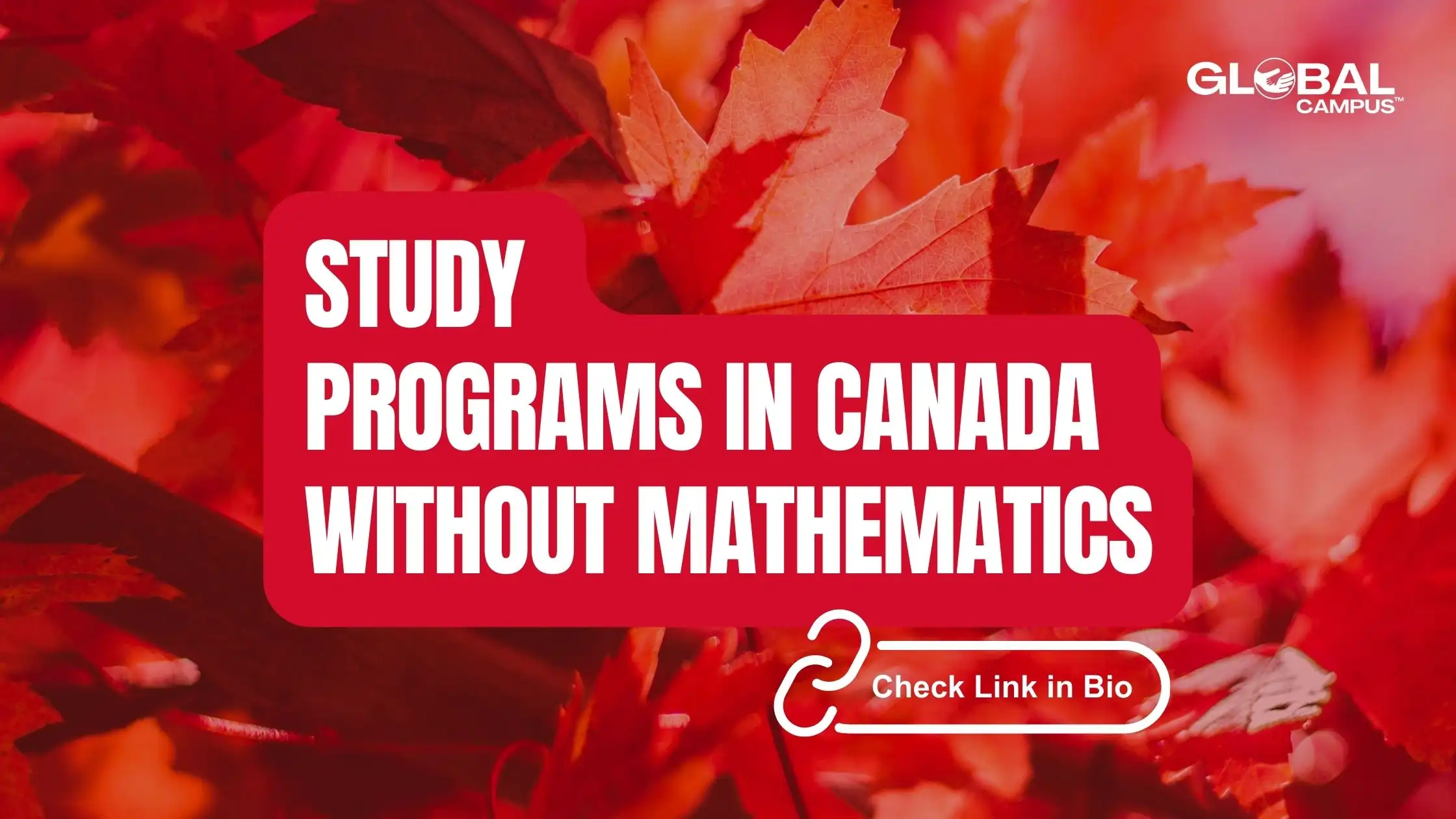
Why Choose Canadian 1-Year Master’s Programs?
Explore logical reasons to pursue 1-year Master’s programs in Canada for international students with Global Campus. Book a free consultation today!
PG Diploma vs. Masters in Canada: Which is better for job advancement? Students and professionals seeking Canadian education often ask this. Understanding the distinctions between these two programmes is critical for attaining your career objectives, whether you wish to improve your academic or practical skills. Both postgraduate programs offer education, but their curriculum, length, and employment prospects differ. PG Diplomas in Canada last 1-2 years, whereas Masters takes 2 years full-time. The GPA requirement for PG Diploma studies in Canada is 55-60%, whereas the minimum for Masters degrees is 70%.

Choosing the appropriate course after graduation might be a challenging decision. Although some students view a master’s degree as a less practical option, others choose to pursue professional postgraduate certificate courses. If you are an individual seeking post-graduation chances to pursue further studies in Canada, it is crucial for you to thoroughly evaluate all available options. Canadian universities provide a range of postgraduate options, primarily categorised as PG diplomas, course-specific masters, and research-based masters.
When considering job advancement in Canada, it is important to weigh the benefits of pursuing a PG Diploma against a Masters degree. Which option would be most advantageous for your professional growth? This is a frequently asked question by both students and professionals who are seeking to advance their education in Canada. Both programmes offer advanced education at the graduate level, although they vary considerably in terms of their course content, duration, and employment prospects. The PG Diploma in Canada typically spans a duration of 1-2 years, while the Masters programme in Canada is a full-time programme lasting for 2 years.
This article aims to provide a comprehensive analysis of the key differences between a PG Diploma and a Masters degree in Canada, with the goal of helping you make an informed decision about your educational and career goals. Gaining a comprehensive grasp of the distinctions between these two programmes is crucial for attaining your career objectives, regardless of whether you aim to enhance your theoretical or hands-on abilities. Now, let’s explore and gain a deeper understanding of Canadian postgraduate education!
The table below compares the duration of the course, total tuition fees, average salary obtained after completing the programme, and other criteria between PG Diploma and Masters programs in Canada:
Parameter | PG Diploma In Canada | Masters in Canada |
Duration | 1-2 years | 2 years |
Eligibility | 3 Year Bachelor’s Degree | 3-4 Year bachelor’s Degree |
GPA Requirement | 55%- 60% | Minimum 70% |
Average tuition fees | 15,000 CAD- 30,000 CAD (9-18 Lakh INR) | 30,000 CAD- 45,000 CAD (18-27 Lakh INR) |
Popular Specializations | Psychology, Nursing, Marketing, Advertising, and PR | IT & Computer Science, Veterinary Medicine, Pharmacy, Nursing, Business Administration |
Popular University | University of Winnipeg | Thompsons Rivers University | Royal Roads University Humber College | Fanshawe College | University of Toronto | McGill University | University of British Columbia | Trent University |
Average salary | 35,000 CAD- 90,000 CAD (21-54 Lakh INR) | 70,000 CAD- 120,000 CAD (42-72 Lakh INR) |
Work Permit | 1-year work permit | 3-year work permit |
A PG Diploma is a concise and focused academic programme that can be undertaken after obtaining a bachelor’s degree. This programme is suitable for students who desire to acquire professional training in any sector. In contrast to master’s degrees, a PG Diploma programme does not require students to complete an obligatory dissertation assignment. Moreover, with a reduced time frame in contrast to a traditional full-time postgraduate programme, it presents a remarkable chance for individuals seeking to enhance their abilities, transition into different job fields, acquire international experience, and establish a robust professional network at a reasonable expense! When comparing a PG Diploma to a Masters degree in Canada, it is crucial to consider the length of the courses. The PG Diploma is a brief educational programme consisting of at least 120 credits, provided by multiple institutions.
The Postgraduate Diploma, commonly referred to as the Graduate Diploma or Graduate Certificate, is a one-year programme given by institutions. The courses prioritise specialisation and industry-driven approaches, enhancing the employability of students. They serve as a means to access employment opportunities or pursue advanced academic degrees. They commence after the completion of a bachelor’s degree. They provide several benefits, which include the following:
Canada has many institutions and colleges offering PG Diplomas in practically every field. Consider these top Canadian PG Diploma colleges and universities:
Master’s degree programs are offered by universities in Canada. There are numerous factors that contribute to the preference of international students for pursuing their master’s degree programme in Canada. Their duration typically ranges from 1 to 2 years. There are two categories of Masters: Course-based education is focused on certain subjects and enhances the candidate’s employability. Another option is the thesis-based programme, which prepares students to pursue a PhD in Canada. Students who possess master’s degrees have a greater rate of employment. Here are a few important points to consider:
Canada is well recognised as a prestigious study location for master’s programmes due to its provision of cost-effective postgraduate degree programmes in several fields of study. In Canada, there is a wide selection of master’s degree programmes available, including Master of Science (MS), Master of Business Administration (MBA), Master of Engineering (MEng), Master of Arts (MA), and other similar degrees. Below is a compilation of commonly sought-after areas of specialty for master’s degrees in Canada:
Check out Canada’s best universities for master’s degrees.
The decision to pursue either a master’s degree or a postgraduate diploma in Canada is contingent upon your career objectives, personal interests, and the degree of specialisation you seek. Here are few considerations to take into account when making the decision:
Opt for a master’s degree if:
Select the PG Diploma option if:
In the end, the decision should be in accordance with your career goals and the field that excites you the most. Both Master’s and Postgraduate Diploma degrees offer distinct benefits and have the potential to lead to gratifying and lucrative professional paths.
Upon successful completion of a two-year master’s degree programme in Canada, international students are able to apply for a three-year work permit in Canada. Graduates who have completed a master’s degree are given preference over those who have completed a PG Diploma. Furthermore, Master’s graduates typically receive greater salaries compared to PG Diploma holders due to their comprehensive understanding of their field of study. In addition to employment, overseas students are provided with competitive remuneration, insurance coverage, and various other perks. Job prospects following the completion of a master’s degree in Canada encompass a wide range of professions, such as engineers, accountants, financial analysts, dentists, nurses, and several others. Upon completion of a master’s degree from a Canadian university, international students have the potential to earn an annual salary ranging from 40,000 CAD to 100,000 CAD or higher.
Top recruiters for jobs after a master’s in Canada:
Upon the successful completion of a one-year PG Diploma programme, international students are entitled for a one-year work permit in Canada, which has the potential to be extended for up to three years. Canada has a significant need for talented individuals in various fields, such as Financial Advisor, Tourism and Hospitality, Creative Design, Project Manager, Data Scientist, and others. In Canada, experience is highly regarded and employers actively seek out candidates with a proven track record. As a result, individuals with a PG Diploma degree often possess valuable job experience gained through internships, which can lead to strong professional connections in the future.
Top recruiters for jobs after PG Diploma in Canada:
In conclusion, it’s critical to take your academic background, professional goals, and the particular requirements of each programme into account while deciding between a Master’s degree and a Postgraduate Diploma in Canada. While a postgraduate diploma is usually shorter in term and more career-focused, a master’s degree offers a greater understanding of a subject and is frequently research-oriented. Your decision should be in line with your long-term career objectives, the amount of time and money you’re willing to invest, and the prerequisites in your area of interest. In the very competitive global job market, both career options can greatly boost your professional reputation and present worthwhile chances for progress.
PG Diplomas are short, one- to two-year programmes that focus on industry and provide specialised training without requiring a dissertation. Two-year master’s degrees offer extensive academic study, often with a research component.
There are benefits to both choices. For people looking for a fast way to enter the workforce with specialised abilities, postgraduate diplomas are perfect. Master’s degrees offer in-depth knowledge and research experience, which frequently leads to higher-paying jobs and opportunities for further study.
Take into account your academic background, research interests, financial position, and professional aspirations. If you want to pursue a career centred on industry training, go for a PG Diploma instead of a Master’s degree in research.
PG Diploma holders can pursue career prospects in various sectors including banking, tourism, project management, and data science. Internships provide valuable job experience that improves employability.
When making a decision between a PG Diploma and a Master’s degree, it is important to take into account the degree of specialisation, research interests, financial commitment, and employment opportunities in your chosen sector.
Top recruiters for Master’s graduates in Canada include Google, Microsoft, IBM, Deloitte, and Siemens.
Top recruiters for PG Diploma holders in Canada include Scotia Bank, Royal Bank of Canada, McKinsey & Company, Bain & Company, and Accenture.

Explore logical reasons to pursue 1-year Master’s programs in Canada for international students with Global Campus. Book a free consultation today!

Discover the essential details about the Provincial Attestation Letter (PAL) requirement province-wise for Canadian study permits.

Explore study programs in Canada without mathematics for international students. Discover humanities, commerce, and science academic options.
Aapka Ek Ek Sawal,
Humaare do do Jawaab
Fill in your details & we’ll call you back within 48 hours.
Fill in your details & we’ll call you back within 48 hours.